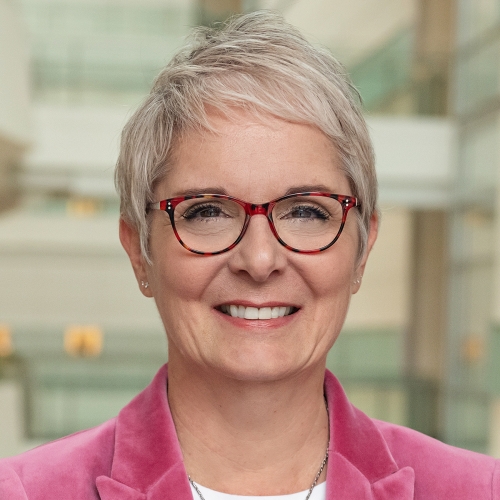
210 Washtenaw Ave, Office 4437
Ann Arbor, MI 48109-2216
Available to mentor

Dr. Carole A. Parent obtained B.Pharm. and M.Sc. degrees from the Université of Montréal and a Ph.D. degree from the University of Illinois at Chicago. After completing a postdoctoral fellowship in the laboratory of Dr. Peter N. Devreotes in the Department of Biological Chemistry of the Johns Hopkins University School of Medicine Dr. Parent joined the Laboratory of Cellular and Molecular Biology at the NCI in 2000, received tenure in 2006, was appointed Deputy Chief in 2010, and Deputy Director of the Center for Cancer Research at the NCI in 2016. After 17 years at the NCI, Dr. Parent moved to the University of Michigan in 2017 as the inaugural Raymond and Lynne Ruddon Collegiate Professor in Cancer Biology and Pharmacology. She is jointly appointed in the Department of Cell & Developmental Biology. Her laboratory is housed in the Life Sciences Institute of the University of Michigan, where she is a Research Professor. Dr. Parent is a Fellow of the American Society for Cell Biology and of the American Association for the Advancement of Science.
Parent Lab
-
InstructorJohns Hopkins University School of Medicine, Baltimore, 2000
-
Postdoctoral FellowJohns Hopkins University School of Medicine, Biological Chemistry, 1996
-
PhDDepartment of Pharmacodynamics, College of Pharmacy University of Illinois at Chicago, Chicago, 1992
-
MSDepartment of Pharmacology, Faculty of Medicine Université de Montréal, Montréal, 1987
-
BSFaculty of Pharmacy Université de Montréal, Montréal, 1985
-
Center MemberRogel Cancer Center
Dr. Parent's research program focuses on identifying the mechanisms that mediate how neutrophils reach infection and injury as well as tumor sites. To do so, her group exploits complementary ex vivo and in vivo model systems, cutting-edge live imaging, and a transdisciplinary approach.
-
Cohen E, Xu Y, Orosco A, Wang D, Johnson CN, Steen K, Sarkar MK, Özlü N, Tsoi LC, Gudjonsson JE, Parent CA, Coulombe PA. 2024 Dec 27;PreprintKeratin 16 spatially inhibits type I interferon responses in stressed skin.
DOI:10.1101/2024.12.27.630544 PMID: 39763960 -
SenGupta S, Cohen E, Serrenho J, Ott K, Coulombe PA, Parent CA. 2024 Oct 12;PreprintTGFβ1-TNFα regulated secretion of neutrophil chemokines is independent of epithelial-mesenchymal transitions in breast tumor cells.
DOI:10.1101/2024.10.11.617845 PMID: 39416223 -
Xu Y, Cohen E, Johnson CN, Parent CA, Coulombe PA. Journal of Investigative Dermatology, 2024 Aug; 144 (8): s86Journal Article496 The stress-induced K16 and K17 differentially regulate innate immune responses in skin
DOI:10.1016/j.jid.2024.06.512 -
Xu Y, Cohen E, Johnson CN, Parent CA, Coulombe PA. PLoS Biol, 2024 Aug; 22 (8): e3002779Journal ArticleRepeated stress to the skin amplifies neutrophil infiltration in a keratin 17- and PKCα-dependent manner.
DOI:10.1371/journal.pbio.3002779 PMID: 39159283 -
Arya SB, Collie SP, Xu Y, Fernandez M, Sexton JZ, Mosalaganti S, Coulombe PA, Parent CA. 2024 Apr 26;PreprintNeutrophils secrete exosome-associated DNA to resolve sterile acute inflammation.
DOI:10.1101/2024.04.21.590456 PMID: 38712240 -
Arya SB, Collie SP, Parent CA. Trends Cell Biol, 2024 Feb; 34 (2): 90 - 108.Journal ArticleThe ins-and-outs of exosome biogenesis, secretion, and internalization.
DOI:10.1016/j.tcb.2023.06.006 PMID: 37507251 -
Xu Y, Cohen E, Johnson CN, Parent CA, Coulombe PA. 2023 Oct 14;PreprintKeratin 17- and PKCα-dependent transient amplification of neutrophil influx after repeated stress to the skin.
DOI:10.1101/2023.10.11.561954 PMID: 37873256 -
Hein LE, SenGupta S, Gunasekaran G, Johnson CN, Parent CA. PLoS One, 2023 18 (9): e0290886Journal ArticleTGF-β1 activates neutrophil signaling and gene expression but not migration.
DOI:10.1371/journal.pone.0290886 PMID: 37682817